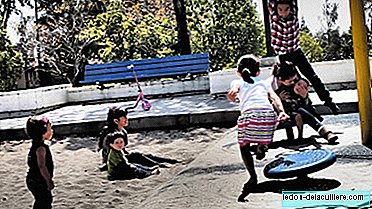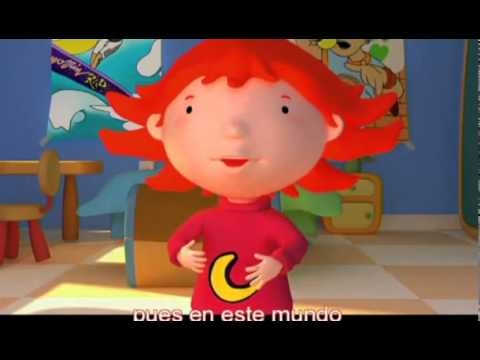
Today is International Game Day, and if it is already quite sad that there should be such a Day, because playing is a childhood activity, and not only in our species; imagined how discouraging it is to know that a third of the kids play alone, for different reasons.
This is only one of the data of a study that despite having been presented two years ago, we can consider that it remains current, since It should be a priority to encourage play in children, and strengthen the spaces so that they could play freely, taking into account the benefits obtained in return.
The Professor of Education Theory of the University of Valencia, Petra Mª Pérez, told us in 2012, that children increasingly spend less time playing, because they are busy in extracurricular activities, but it is also that those who play alone, They do it especially with video consoles, devices to which today add tablets and smartphones (that this technology advances very quickly for good and for bad). The study was called "Game and Family", and analyzed the binomial family - game, with the aim of knowing the quality and quantity of family play and leisure of fathers and mothers with children between three and 14 years.

Who do children want to play with?
Well, with other children, and especially those with more closeness or affinity: partners, neighbors and friends. And do not fool ourselves, although parents should encourage family moments such as outings, visits to grandparents, board games, or watch movies together, even get involved in the game with the console; To play freely children prefer their peers.
This may have to do with the The need to build group rules, explore a world along unrestrained roads (for them), and build spaces outside the adult world. And this is what children of now, 20, 40, 60 or 200 years ago, want, and should do as part of their development and learning.
But today, many children have difficulty getting to know their neighbors well (shortly after school, scheduled weekends, parents who don't get involved, incompatible schedules), and sometimes friends live far away, or can't meet with their classmates, because it is not good for us to go out with them, and we do not let them travel through the neighborhood.
In addition, today families are small, and to aggravate the situation, cousins may live many kilometers away ...
Are all these excuses or part of reality?
Do parents agree to play 30 minutes a day during playground time?, 30 minutes under the supervision of teachers (which I do not say is wrong), unable to leave the premises, in the middle of other children who would not choose (or yes) as playmates if they were not limited ... We can conform Why don't you go with us, do you?
When they leave in the afternoon (some are lucky enough to return home at lunchtime), they may have English, karate, instrument practice or skating. More rules, little spontaneity, no socializing game (But humans are social beings, as I understand it).
Ok, we are the parents, and in an acceptable situation, we can have time and desire to play, is it the same? Well, no, of course, because it will be fun for both parties, and will strengthen family ties, but Children will not be able to develop necessary social skills (negotiation, conflict resolution), or physical (exercise balance when climbing, strength when branches are taken to the cabin, resistance when running). It's not the same, no.
Children need to play with other children for their integral development and not only to have fun as parents say (78.7%) because the socializing game is the one that allows greater development of their emotional and social skills
Are we going to continue without changing anything?

We can, if they are small, take them to the park (we aspire and fight for 'green' parks as Soledad Román used to say), and let them explore without making parents helicopters; if they are over 8 years old (9, 10, depending on where we live), let them leave home alone to go to the street to interact with the children they decide.
You can also organize meetings between children in a public space, at home (if there is room), or simply create a bond with the family of our son's best friend, our daughter, so that they spend a couple of afternoons a week together, if the parents do not have to wait for the games to end: 'one day I take care of them, another you'.
It is even possible to knock on the neighbor's door, with the excuse of a new toy, of a question, so that two children know each other, and who knows ... nothing happens, even if the other parents seem upset by the visit, or if The neighborhood has no interest in us. When we try nothing, we get nothing.
The low rate of children's play in Spain, is due to the lifestyle of Spanish families influenced by the advancement of urban culture, with unique children or distant ages, which subject the game to extracurricular activities and in whose environment they have reduced both the play spaces and friends and neighbors of the same age to play
To Professor Petra Mª Pérez, after completing the study, He was worried that adults encouraged children as young as 3 and 5 to play with electronic devices considering the latter as an easy and effective entertainment instrument, although it encourages loneliness. Two years later, Japanese pediatricians have already warned about the inconvenience of allowing devices to become electronic nannies.
And it is that regardless of what I think we should understand that technology has come to 'add' not to separate children from necessary activities biologically, psychologically and socially ... I think we are losing sight of the fact that play is a children's right , regardless of the time they have lived.
Images | Ian D. Keating, Lotzman Katzman, Joe Loong More information | Universitat de València In Peques and More | A study by the AEFJ reveals that one third of children over 9 years old play less than an hour a day. The game is the best extracurricular activity according to the Children's Game Observatory












